TSUNAGU: To Connect. Whether it is connecting employers to job seekers or bringing different cultures together, we at Activ8 value the bridge-builders who make our world a better place every day. Our new series, TSUNAGU, will feature inspirational people who connect the U.S. and Japan through business, education, art, culture and more.
Shiori Yodono: Entrepreneur, Former American Professional Basketball Player
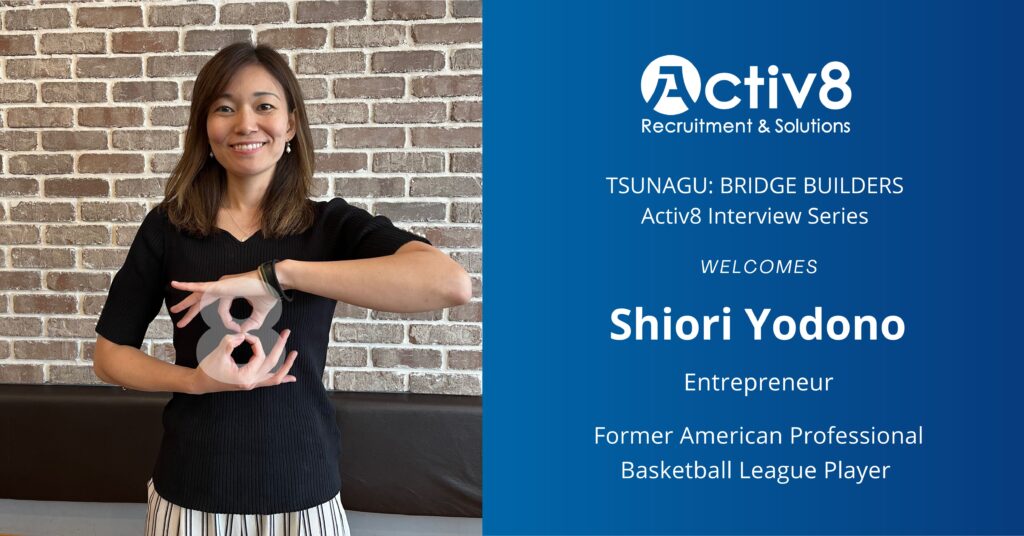
Shiori Yodono had a dream to play professional basketball, and within a year of deciding to make the big jump from Japan to the USA, the Mecca of basketball, she won a professional contract, and played for the Chicago United Breeze in the Women’s Premier Basketball League. After gaining more experience playing for multiple teams, she launched ATO International Sports Management LLC, a company that supports young Japanese athletes and professional basketball players aiming to go abroad. Now, as she pursues what she calls the “Road to the Basketball,” Yodono is like the protagonist of a sports anime, working with determination to become a bridge that connects Japan and the United States through sports. We asked the 33-year-old Yodono the secret of her success:
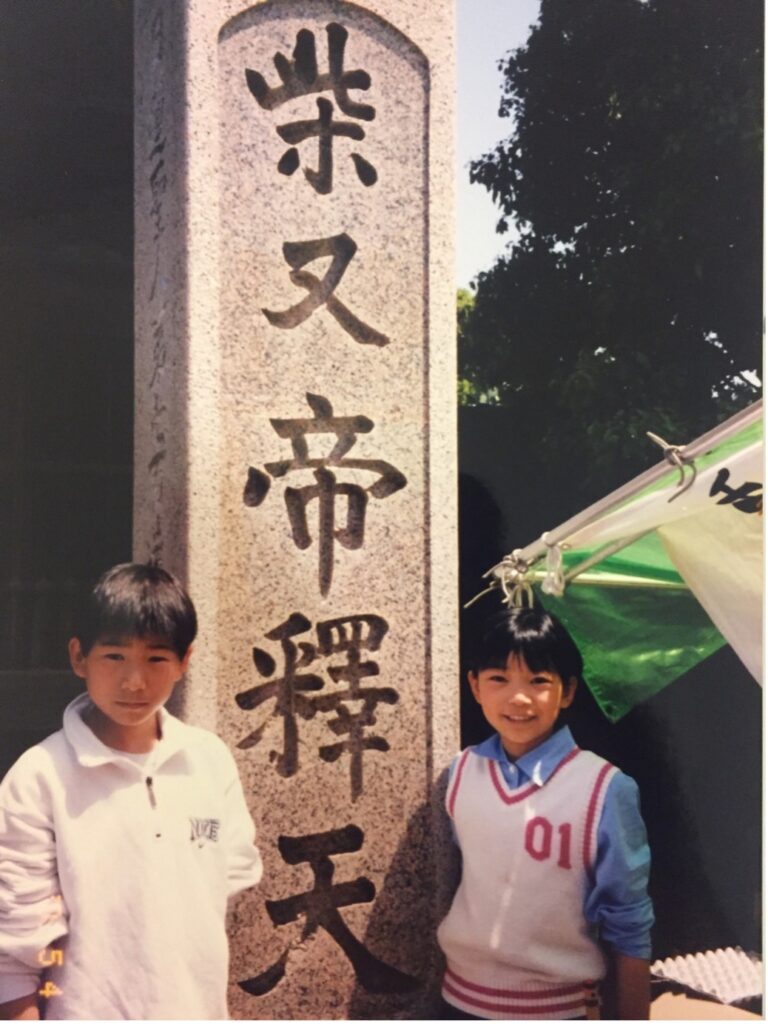 Photo: Yodono (right) with her brother, who paved the way for her basketball career
Photo: Yodono (right) with her brother, who paved the way for her basketball career
Childhood: When Dribbling was Impossible
Her first encounter with basketball was in elementary school. While attending her brother’s practice, she was recruited to the girls’ team to fill in. She couldn’t dribble, and she ran around the court with the ball, causing a series of traveling fouls. But she was lucky that her older teammates treated her like a little sister and let her learn basketball at her own pace. It was around this time that she began to acquire the ability to steal people’s tricks by watching them play.
She experienced a turning point in 6th grade. One of the players on the regional team in Ibaraki Prefecture, where she lived, resigned, and Yodono was asked to take her spot. When people around her congratulated her, however, she didn’t exactly jump up and down and think, “Lucky me!” A sore loser by nature, she let her disappointment of not being selected at first show on her face. “Frustration makes me burn more than successful experiences,” she said. Since childhood, this ability to persevere through hardship has helped her thrive.
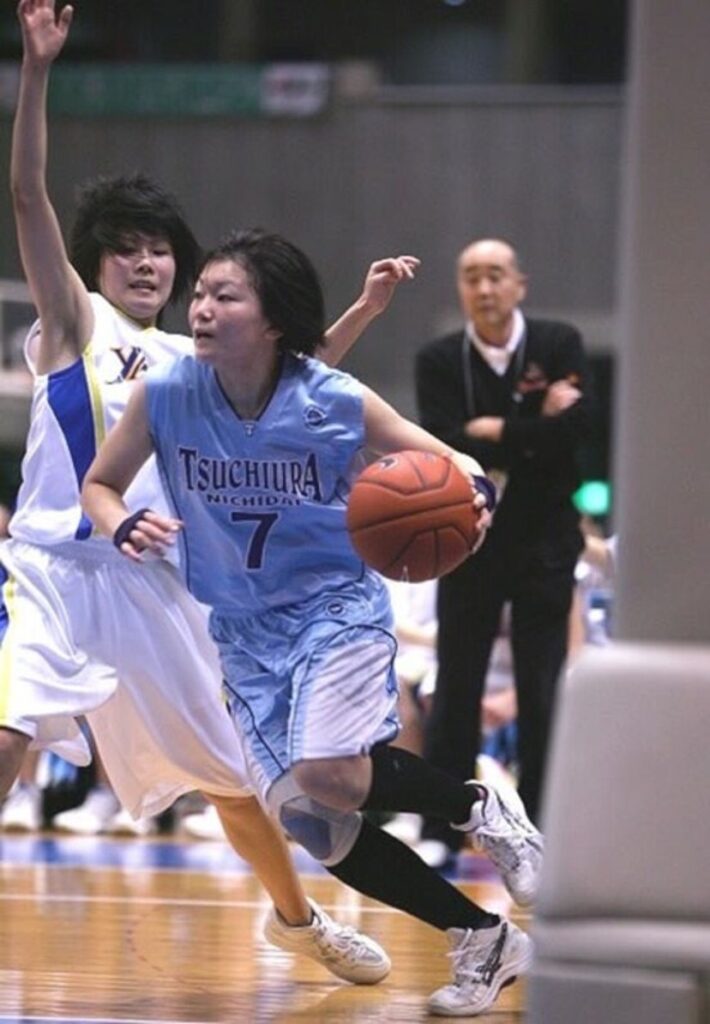 Photo: At Tsuchiura Nihon University Senior High School, where Yodono developed the ability to “See.”
Photo: At Tsuchiura Nihon University Senior High School, where Yodono developed the ability to “See.”
Go As Far As You Can
Yodono started seriously aiming to become a professional player when she was in junior high school. While immersed in basketball under a strict coach, she was selected as a prefectural player for Ibaraki Prefecture. That’s when she first thought, “I want to go as far as I can go in basketball.” When she was in her third year, a nearby high school recruited her to join their team upon her junior high school graduation. But she was disappointed when she heard that the high school coach who she liked might quit. Searching for an alternative, she visited the basketball club of Tsuchiura Nihon University High School. The coach who saw Yodono play told her, “You have an amazing eye.” He perceived her ability to learn each player’s moves very quickly.
She participated in a tough practice with the Tsuchiura Nihon University High School team, and at the end, there were smiles on the faces of the team members, and the seniors looked at the coach with great respect. It all made her decide instantly, “This is the place!” She enrolled in this high school against her parents’ wishes, who were concerned about the two-hour commute each way. The team scored in the top 3 of high schools in Japan, and Yodono was ranked as one of the top 5 players in the country. In college, she was selected as a member of the Japanese national team in the U-19 (under 19) category, and the women’s basketball team at the University of Tsukuba, where she was enrolled, won the national championship at the All Japan Collegiate Championship.
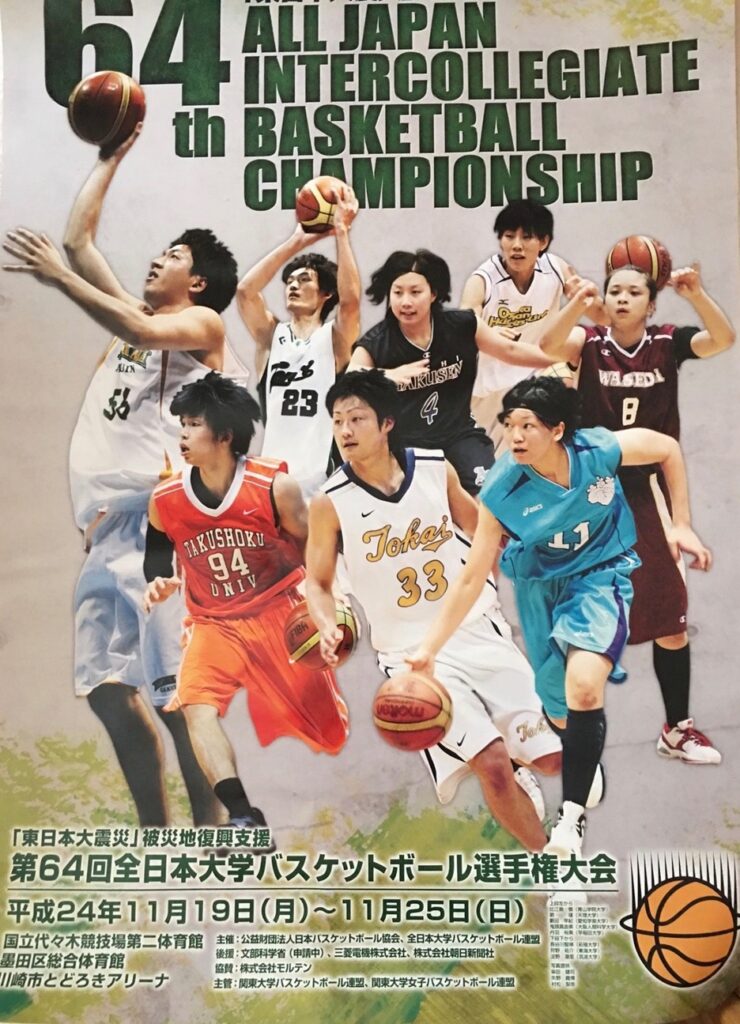 Photo: During her University of Tsukuba days, Yodono played on the All Japan Team.
Photo: During her University of Tsukuba days, Yodono played on the All Japan Team.
Another Turning Point: Pro Athlete in Japan or Study in America?
Yodono faced a second turning point during her senior year of college. She had an offer from a professional team in Japan, but suffered a recurrence of a chronic illness, and for a time, could not play at all. While she wondered if she could continue as a player, she decided to study coaching in the United States, and did not accept the invitation to join a professional team. Yodono’s position was point guard, but as the game captain, she gave instructions to the other players, making her the “manager on the court” who pulled the team together. Rather than making shots herself, she found joy in motivating the other players to create situations where shots are scored. It seemed only natural to learn coaching to help players grow. Once again, she faced strong opposition from her parents, but there was no stopping Yodono from deciding to study basketball in the U.S. Without speaking English, she plunged into her new life at West Virginia University.
The Road to Becoming a Professional Athlete
While she was playing casually on the college’s basketball court, a recruiting coach watched Yodono play and invited her to join the team. The West Virginia University women’s basketball team belongs to Division I, the highest level of the National Collegiate Athletic Association (NCAA), and attracts excellent players from all over the United States. When she first started playing as a trainee, Yodono was overwhelmed by the size and power of the other players, but eventually gained confidence. Her skill and determination were recognized by the team’s manager and she was encouraged to enter an independent professional league, saying, “You can coach anytime. You should be a player.” She decided to take a leap and shift her path.
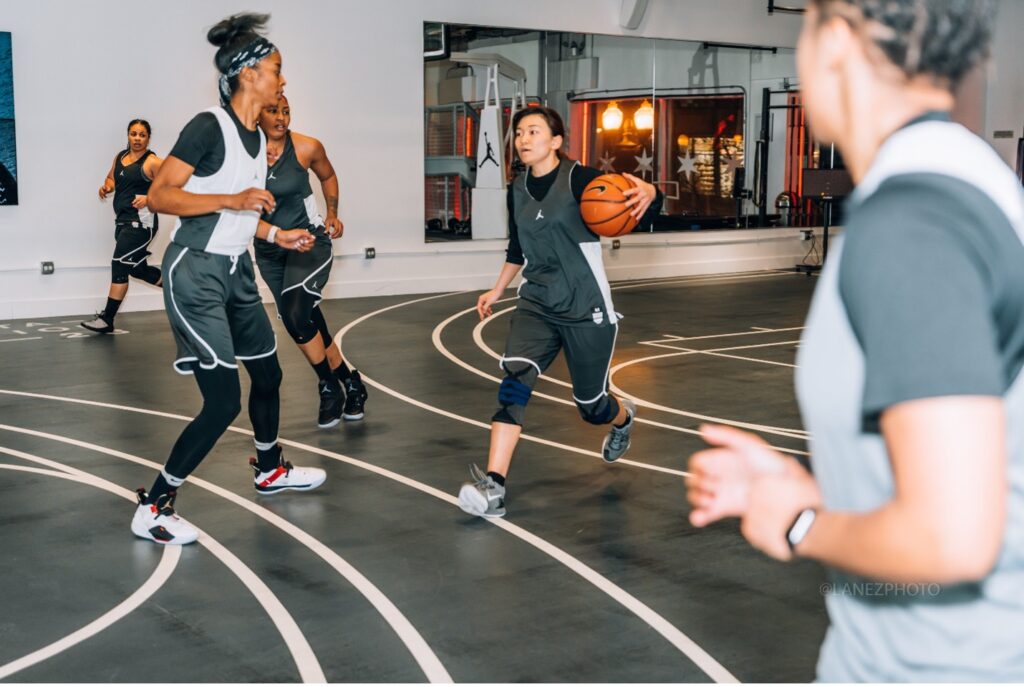 Photo: Fulfilling the dream: Yodono’s professional debut in the United States
Photo: Fulfilling the dream: Yodono’s professional debut in the United States
The Bitter Experience of Anti-Asian Discrimination
Her first tryout was for the Atlanta Angels of the Women’s American Basketball Association (WABA). It was a three-day training camp, but she was cut off at the end of the first day, even though she scored the most shots and dribbles. From the beginning, the black coach did not even make eye contact with Yodono. It appeared that the coach had no intention of including an Asian in the team in the first place. Yodono thought it was unreasonable, but at the time, she couldn’t complain or even ask “Why?” After returning to her hotel, she spent the remaining two days planning her next moves.
The more she thought about it, the more she realized something profound about the difference between Japanese and American customs. Japan has a caring culture where teammates and coaches sense a lot without words. But in the US, every player will be tested on their independence and ability to communicate and express their intentions. Until then, she thought, “I just have to show them how good I play.” But after the Atlanta Angels’ tryout, she realized that just showing your skill on the court is not enough. She decided to change her approach and set her mind to do two things: Be the first one to show up on the court to prepare for the game, and proactively communicate with the coach.
In the United States, racism is a sticky issue in the sports world. In the final game of this year’s NCAA women’s basketball tournament, a black Louisiana State University player imitated the hand gestures of a white University of Iowa star player. It sparked a sharp debate about discrimination over social media. Yodono must have experienced a lot of discrimination as an Asian, but no matter how bitter the experiences were, she tried to see them as just stepping stones to reaching her goal.
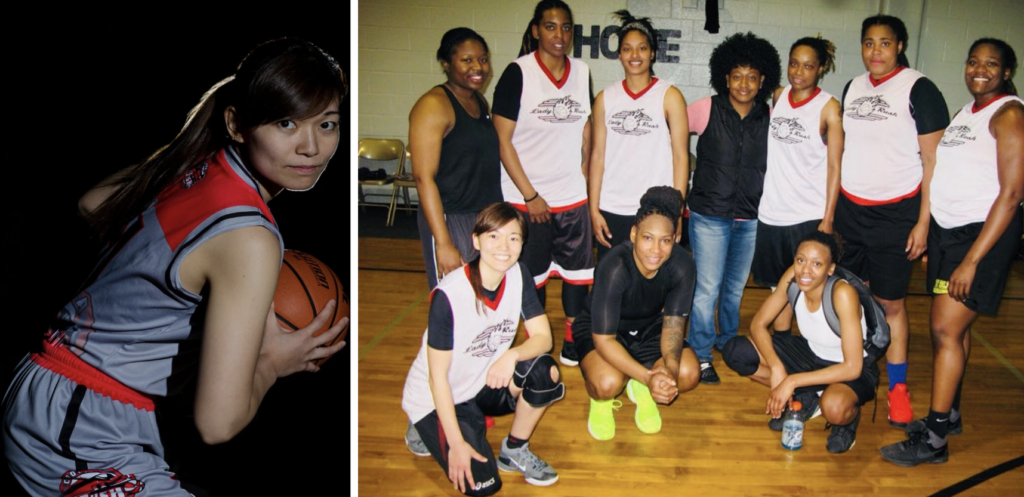 Photo: Yodono with her Carolina Lady Rush teammates. Left photo credit: Shiori Yodono website
Photo: Yodono with her Carolina Lady Rush teammates. Left photo credit: Shiori Yodono website
Balancing Act: Professional Athlete and Student
After the bitter days in Atlanta, she headed to tryouts for the Carolina Lady Rush team in North Carolina, part of the Women’s Blue Chip Basketball League, the premier professional development league for women basketball players. It was totally different from Atlanta: The coach there proclaimed “A great player has arrived,” and Yodono was hired on the spot.
In the end, she was at West Virginia University for less than a year. In North Carolina, she studied health sciences at a community college and earned certifications in sports medicine and rehabilitation, sports coaching, and management. It was difficult for her to obtain a national qualification due to language difficulties, and she developed calluses on her fingers from studying so hard.
To Chicago
After the Carolina Lady Rush, Yodono went through tryouts again and was transferred to the Chicago Steam, part of the Women’s American Basketball Association, and headed to Chicago. Yodono was overjoyed to be in the city where former Chicago Bulls player Michael Jordan, whom many still regard as the “God of Basketball,” led his team to six National Basketball Association championships. Then she signed with the Chicago Breeze and played with them in 2021. A door to a new life opened when she met her husband at a pick-up game on the basketball court in the gym. She gave birth to a boy and started her own business.
Entrepreneurship, a Breath of Fresh Air in Japan’s Women’s Basketball World
It was in Chicago that Yodono came to realize Japanese women basketball players have the potential to compete on an equal footing with the world’s top players. She launched ATO International Sports Management Group to support athletes aiming to compete on the world stage. In May of this year, she held an event called “Bridge the Gap” for the second time following the first gathering in 2022. For athletes who want to work as professionals overseas or who want to advance their career through basketball, the program provided coaching, networking and held Japan-U.S. exchange events in partnership with the Global Women Basketball Association, an independent professional league in the United States.
 Photo: Players smiling at Bridge the Gap event.
Photo: Players smiling at Bridge the Gap event.
The cost to hold this event is prohibitively high, but participating players only have to pay for their meals. Expenses for travel and training are covered by ATO, who recruit sponsors. Yodono said she’s so busy during the event that she doesn’t even have time to eat, and loses 5-8 kilograms each time. Why go that far? Yodono strongly believes that Japanese women basketball players, the best of whom won the silver medal at the Tokyo Olympics, can do more overseas. However, compared to Europe and the United States, Japan’s players still lack the flexibility and support from companies to take on overseas challenges, making it difficult to transfer players to other countries. Players who do not speak English well and don’t have enough knowledge are often ripped off by overseas agents, and there are many other obstacles that arise from being unaccustomed to operating in a different country.
If the transfer of Japanese players becomes as free as in Europe and the United States, those who have learned overseas will be able to transfer back to Japan and use the knowledge they have learned to improve the level of play at home. Yodono is setting a long-term goal and paving the way for generations to come.
Educating the Youth
Yodono is also devoted to educating the next generation of players. She runs basketball classes for Japanese youth on a court that she remodeled at her home in Long Grove, a northern suburb of Chicago. The Japanese way of teaching is to say, “Don’t make mistakes!” But here she teaches “Don’t be afraid of making mistakes.” Japanese coaches scold students when they make flashy plays such as passing the ball between their legs, but Yodono compliments them by saying, “You’re cool!” She says that young talent will grow by letting them play freely.
 Photo: Yodono with the students at her basketball class.
Photo: Yodono with the students at her basketball class.
Most Painful Time?
When asked about her most painful experience, she said that it was the daily life of the basketball club in her high school days. “It’s a funny story now,” Yodono said, but the situation at the time was truly difficult. The woman coach was a passionate type who didn’t care about appearances at all and was devoted to basketball only. Insults and corporal punishment were the norm, and every day before practice, she would go to the bathroom and vomit due to anxiety and nervousness. She even wrote a will with her teammates, and was taken to the hospital many times with acute gastroenteritis. She was afraid to speak face to face with her coach, and constantly lived with fear.
At that time, the only salvation to her pain were the pleasant memories of basketball in the past that reminded her of how much she loved the game. Even now, she still remembers telling herself over and over not to start hating basketball.
“Compared to how hard it was back then, I was able to endure anything in my life in America.”
That coach was so scary, but taught Yodono how to face basketball seriously. Now that she is in the same position as a coach, she said, “I have a solid answer for Spartan guidance and mental strengthening.” Because she was able to see both the good and the bad sides of an overly rigorous education, she developed a teaching method that incorporates the best aspects of her training, focusing on positive advice, and cherishing the spirit of “If you like it, you can be good at it.” She tries to pass that on to the children she teaches in basketball classes.
Career is a Place to Shine
Finally, when asked for her advice to those trying to advance their careers, she replied, “Don’t compromise. Pursue a place where your passion shines. For example, when looking for a job, do not choose a company based on what other people say, or because the money is good, or because of the company’s brand. If you pursue something worthwhile, the money will come, and even if it takes time, don’t give up!”
Even after retiring from a professional athletic career, Yodono continues to challenge herself. To raise the level of basketball in Japan, she thinks it’s necessary to improve the quality of coaching. Yodono is now considering whether her next step should be a coaching program. She will also focus on overseas education programs for basketball players. She has already run the program five times, and she feels like she’s helping many young players play freely and become professionals. In the future, her dream is to create a reverse import flow that transfers overseas players to Japanese leagues.
A long time ago, her host family said to her, “There is an American dream, but there is no such thing as a Japanese dream.” But Yodono is pursuing her Japanese dream in America, and bringing the athletes of both countries closer together in the process.
RELATED SITE
ATO International Sports Management LLC

